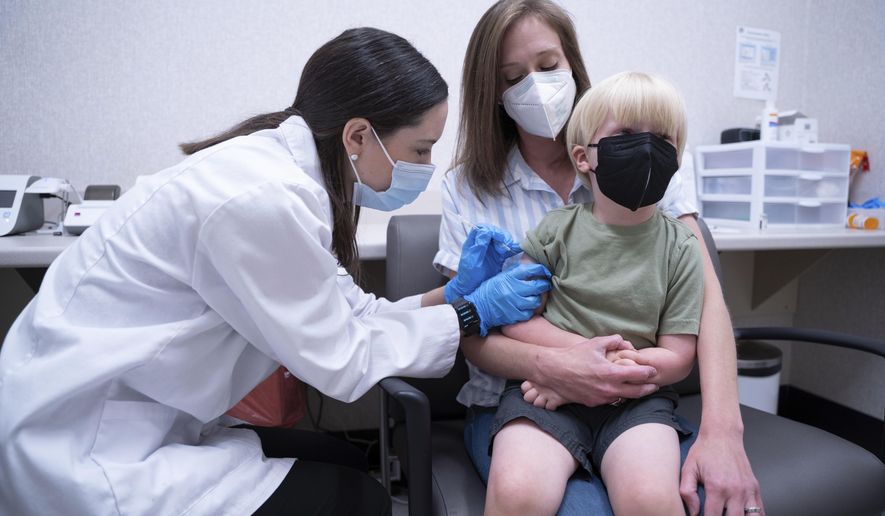Kids aged 6 months to 5 years old will begin to receive COVID-19 shots in earnest on Tuesday, but the campaign will be centered on pediatrician offices and select pharmacies, giving the rollout a different look than mass efforts for older ages that featured converted gymnasiums and drive-thru centers.
There might also be less enthusiasm for this rollout, given the perception the coronavirus does not cause much severe disease in children, although federal officials say 442 children in the newly eligible age group have died from the virus and thousands more have been hospitalized.
President Biden plans to promote the shots from Pfizer-BioNTech and Moderna in a speech from the White House on Tuesday afternoon. The rollout will gain momentum this week, after the Food and Drug Administration and Centers for Disease Control and Prevention signed off on the shots over the holiday weekend.
There is pent-up demand among some parents to give their kids some protection, while polling suggests more than a third of families are in a “wait and see” mode as the first round of shots reaches the youngest kids.
“I would anticipate a burst of uptake as those parents who have anxiously been awaiting the protection for their kids can get it. Then I think it will take time and be incorporated into the routine visits that young children make to their medical home,” said Claire Hannan, executive director of the Association of Immunization Managers.
“Medical home” refers to practices run by pediatricians and family physicians.
“Some pharmacies will also carry the vaccine, but not a high percentage of them,” Ms. Hannan said.
White House COVID-19 Coordinator Ashish Jha said the administration designed the rollout to make kids feel comfortable.
“This vaccine rollout may feel a bit different than prior ones. Because it is. No mass vax sites. More vaccines and vaccinations in doctors’ offices,” he tweeted. “Why? Because we looked at the data on what parents wanted. Parents are clear they want to vaccinate their littlest ones in familiar settings —doctors offices, pharmacies, health clinics, and children’s hospitals.”
Dr. Jha said shots couldn’t be shipped across the nation until the FDA authorized them for emergency use on Friday. Some places started to receive and give them Monday, though others places might not be able to start until Wednesday or Thursday.
Fletcher Pack, 3, was one of the first of the newly eligible kids to get the vaccine in the U.S., The Associated Press reported. He received his shot Monday at a Walgreens in South Carolina.
Fletcher’s mother said he will be able to play with kids indoors and go to more public places, like the nearby children’s museum.
SEE ALSO: CDC director approves COVID-19 vaccines for children under 5
Pfizer is offering a three-dose regimen for children ages 6 months to 4 years that uses one-tenth of the adult dose. It released data in May that showed a preliminary efficacy of 80% after the third dose, though it was based on a small sample of symptomatic cases in the trial. A final analysis is pending.
Moderna is offering a two-dose regimen for children ages 6 months to 5 years that uses one-fourth of the adult dose. It released data in late April that said the shots were 37% to 51% effective against symptomatic infection — a low level that is still on par with what adults would expect against the omicron variant after two doses.
It is studying the impact of a third dose in children, meaning the drugmaker could catch up to Pfizer’s version and provide similar levels of protection.
CVS Health said it will begin administering the Pfizer version to newly eligible persons on Tuesday at 1,100 of its MinuteClinic locations.
Company spokesman Matt Blanchette said board-certified nurses, nurse practitioners and physician associates at the sites “have significant experience providing vaccinations to a younger population as well as private exam rooms, which will make the process easier for kids, parents and guardians.”
CVS will give the COVID-19 shots to children 18 months and older — in line with other vaccines these clinics provide — so the company said parents of children 6-17 months seeking the vaccine should contact their pediatricians.
A new Harris Poll suggests parents who are immunized are more likely to bring their kids forward for the shots.
The poll of 306 parents of kids under 5 years old found that 73% of vaccinated parents said they’re likely to vaccinate their kids under 5 but only 35% of unvaccinated parents would.
A Kaiser Family Foundation poll in April found that only 18% of parents with children under 5 planned to get their kids vaccinated right away, while 38% were in a “wait and see” mode.
Another 11% said they would get their children vaccinated if required, and 27% said they would definitely not seek out the pediatric shots.
Governors have taken divergent approaches to the shots.
Florida Gov. Ron DeSantis, a Republican, said the state will not use any state resources for the under-5 rollout but he won’t prevent doctors and hospitals from ordering them on their own.
Pediatrician groups complained that Mr. DeSantis’ stance delayed the rollout because states typically facilitate the process by pre-ordering the COVID-19 vaccines.
Other governors promoted the pediatric vaccine as soon as it was approved.
“Vaccines are safe and effective tools against serious illness, hospitalization and death. We have pre-ordered vaccine doses and have been working with our vaccination sites and healthcare providers to get them ready to vaccinate these younger children, and they are prepared to begin as soon as they receive the vaccine,” New Jersey Gov. Phil Murphy, a Democrat, said over the weekend. “We encourage parents of young children to schedule an appointment to get their child vaccinated. Parents who have questions about the vaccine should talk to their pediatrician or health care provider.”
For more information, visit The Washington Times COVID-19 resource page.
• Tom Howell Jr. can be reached at thowell@washingtontimes.com.




Please read our comment policy before commenting.